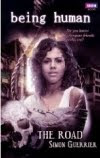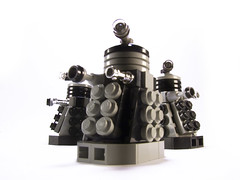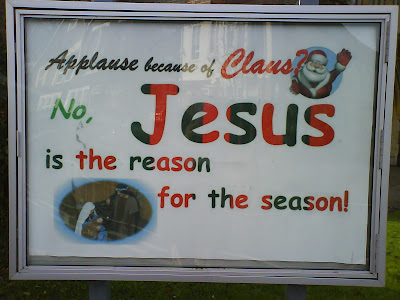Hello children. Have you been good?
Father Christmas – that's me, hello! – will only bring you presents on Christmas Eve if you've been good. That's what the grown-ups tell you, isn't it?
In the days leading up to Christmas, you might hear it a lot. Grown-ups say it when they think you're being too noisy or silly, or when they want you to help with the chores. Have you noticed?
Be good and good things will come to you. Be bad and I won't visit you, or I'll just bring you single lump of coal, or even a birch twig for hitting you with. That's the story.
And it's a good story. My name's been used to make children behave for more than a thousand years.
It's a bit like other stories you'll hear a lot from grown-ups. That you have to do well at school or the rest of your life will be ruined. That there's something wrong with you if you don't cheer a particular football team or pop group or politician.
That if you're good you go to Heaven, while people who lie or cheat or make you cry will go to Hell. That life might not seem fair but gods and spirits watch over us who know best.
You can see why these stories keep getting told. It's nice to think that good things happen to good people. We'd like to think stories like that were true. And that's useful to the person telling the story, because it means we're likely to behave how they want.
Some people don't like to be reminded that I'm only a story. They think I don't matter if I'm not true. But stories are how we learn things. They shape who we are and how we behave. So they're very important.
And I love the story of Christmas. How can you argue with a story that says you should be good, that you should help other people and not be greedy or mean? Christmas is a time for catching up with family and friends. It's a time for giving gifts. The grown-ups don't go to work, and there might be parties and games. It's great!
But like any story, Christmas is sometimes used to persuade you to think or do something. Some people will tell you that Christmas is a Christian celebration – that it's the day we remember the birth of Jesus. They might even tell you that 25 December is Jesus' birthday, or that all the stuff about being good and giving good is
because it's a Christian celebration.
But Christians aren't the only people who tell their children to be good. And a lot of the traditions of Christmas aren't Christian at all.
Jesus was born in a place called Bethlehem, which doesn't have reindeer or holly, and where it doesn't often snow. Those things all come from northern Europe, and pagan traditions in winter. At the darkest and coldest time of the year, the people in northern Europe would keep themselves warm with a big party and stories.
Early Christians joined with the pagans, mixing their stories up together. That helped the pagans to become Christians. Christmas was just one of the stories the Christians took over for themselves.
Some people might tell you that I – Father Christmas – am a Christian, too. That my other name, “Santa Claus”, comes from a real man, Saint Nicholas, who was a Christian bishop in Turkey.
But again that's just part of my story. The way I look now, in my fur-lined clothes, with my big belly and red cheeks and even my laugh, that's all part of north European – and pagan – traditions. Ho ho ho! I have more in common with a woodland spirit called the Green Man than with the real Bishop Nicholas. He wouldn't have driven a sleigh or climbed down people's chimneys.
Other people have used Christmas – and me – to sell fizzy drinks or stationary. Shops and charities and holiday companies all use Christmas to make us give them money. There are Christmas films and TV programmes that show us how we should behave – with families all together, eating Turkey and pulling crackers.
It's such an established story, told again and again, that it must feel strange and sad if you don't take part. I sometimes get letters from Jewish and Muslim children, wishing I would visit them, too. And sometimes, with their parents' help, I do.
How could any one be upset by that? I'm a nice, friendly, generous character who helps make children behave. I'm so familiar even adults can feel warm and cosy when they see me.
But I'm not real. I'm a story. And I'm a story for children. I can't think of anything more important or valuable to be. I'm happy being a story.
I'd worry if grown-ups still thought I was real, not a game of let's-pretend. And since I get used to shape how people behave, there's a risk that sometimes I might be used to make people do bad things, or to convince them of things they normally wouldn't believe.
Would you trust a doctor or teacher who told you they believed in Father Christmas? Would you vote for a politician who did? Would you follow one to war? If someone on trial said they believed in Father Christmas – or that I told them how to behave – would you let them go? Or would it worry you that a grown-up still behaved because a children's story? That doesn't sound very grown up at all.
What is being a grown up? I think it's knowing that a story isn't true just because we like it or want it to be. When someone tells you a story, watch they're not trying to change how you behave. And just to make things tricky, this is a story too. Right now, I'm trying to change how you think and behave. Ho ho ho!
I love the story of Christmas – and stories generally. Just remember that they're stories. You shouldn't need to be told to be good, should you?
Merry Christmas. And I hope to see you again this evening. Do leave me a mince pie.
Love from
Father Christmas

















